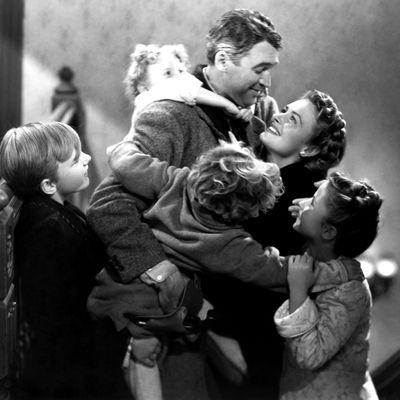
“No man is a failure who has friends,” says Clarence, Angel Second-Class, to George Bailey at some point during George’s long, dark night of the soul that happens way farther into director Frank Capra’s Christmas classic It’s a Wonderful Life than you think. That line is one of the great consolation prizes in all of American fiction. Sure, George Bailey may have lost out on a life of wealth, freedom, and globe-hopping, but he does have friends. So that’s nice.
One hopes Frank Capra had a lot of friends on the night of the 1946 Academy Awards, when It’s a Wonderful Life showed up with five Oscar nominations — for Best Picture, Best Director, Best Actor (James Stewart), Best Editing, and Best Sound — and lost all five. Four of those losses came to The Best Years of Our Lives, the topical post-WWII picture directed by William Wyler, who at the time was co-founder, with Capra, of Liberty Films, which distributed It’s a Wonderful Life. The sweep by The Best Years of Our Lives was, many assumed, the final nail in the coffin for It’s a Wonderful Life, which was a box-office disappointment and generally viewed by critics as overly sentimental and self-indulgent. The Oscar drubbing (it did receive a non-competitive technical award) seemingly put It’s a Wonderful Life out of the public imagination forever. Capra would go on to direct a handful of other movies (including Pocketful of Miracles in 1961), but was never again nominated for Best Director.
And It’s a Wonderful Life went away for decades, until 1974, when the great Clerical Era That Saved Christmas allowed the copyright on the film to lapse, and thus It’s a Wonderful Life entered the public domain. TV stations, seeing a free programming they could plug in around the holidays, began to run it incessantly. This is why the joke was always that you could watch It’s a Wonderful Life around the clock during December. (There’s no proof of this, yet that’s probably what inspired TBS to run 24 hours of A Christmas Story, but I digress.) This went on until 1993, when a loophole was closed, and NBC purchased sole rights to air the film, as they continue to do presently, twice a year, one of them on Christmas Eve. It’s become a Christmas tradition, and by far the best-known of the crop of 1946 Oscar nominees and winners.
You could say this was an unusually roundabout path towards becoming a holiday classic, except it’s kind of true of all the movies that have settled into the present-day Christmas canon. For example:
-Home Alone was beat up by critics and resented for its commercial success. Score and Song nominations were likely based on John Williams’ sterling reputation.
-The 1951 Scrooge with Alistair Sim that everybody says is the best version of A Christmas Carol ever (though try telling that to a Muppets fan; actually, don’t) was a box-office disappointment in the U.S. and an Oscar shut-out.
-Scrooged only got a Best Makeup nomination and was a modest box-office success.
-Love, Actually was the subject of a good deal of Oscar buzz, mostly because writer/director Richard Curtis had seen his screenplays for Four Weddings and a Funeral and Bridget Jones’ Diary get nods. Yet despite a handful of precursor nominations (and a few wins) for Curtis and film stars Emma Thompson and Bill Nighy, the Oscars passed entirely.
-They also passed on The Family Stone, or “So Much for the Tolerant Left: The Movie,” which has pushed its way into the Christmas canon via persistence and the power of a good kitchen. Despite big early Oscar buzz for Diane Keaton, the film was blanked for everything except a Sarah Jessica Parker Golden Globe nod.
-And what of all those “but it’s a Christmas movie” technicalities and provocations?? Gremlins? Nothing. Tangerine? Nada. That scene in Jarhead where naked Jake Gyllenhaal is go-go dancing wearing only a Santa hat? Blanked. Batman Returns? A measley two for Visual Effects and Makeup. By far the biggest winner here is Die Hard, which managed four nominations (VFX, Sound, Sound Editing, Film Editing), though it won none.
The point is, just because It’s a Wonderful Life got swept out of the room on Oscar night didn’t mean that it couldn’t establish itself as a canonical Christmas classic. It just took a lot longer. Atta boy, Clarence and opportunistic TV station managers!
More From This Series
- The 2025 Oscars Will Have Conan O’Brien, a Wicked Performance, and a Surprise
- Cheese: An Annotated History of the Oscar Class Photo
- Seth Rogen Will Always Speak His Mind at an Awards Show


